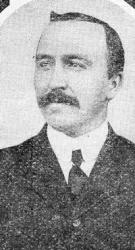
1885 - 1959 Person Name: H. L. Hymnal Number: 49 Author of "Dusky hands are reaching for the bread of life" in Reformation Glory Rv Haldor Lillenas DMus Norway/USA 1885-1959. Born at Stord, near Bergen, Norway, his father sold their 15 acre farm in Norway and emigrated to the U.S., buying a farm in Colton, SD. After he built a sod house, the family (wife and three chldren) also came to SD in 1887. They moved to Astoria, Oregon in 1889, where Lillenas learned English and began writing song lyrics at an early age. In 1900 the family moved again to Roseville, MN, where he worked as a farm laborer and began attending a Lutheran high school at Hawick, MN. He sold a few songs at age 19. At age 21 he began writing more songs, encouraged by some earlier ones becoming popular (“He set me free” was one). His mother died in 1906 and his father returned to ND, but Lillenas decided to move back to Astoria, OR, to finish a chemical correspondence course he had been taking. There he found employment in a chemical factory. He started attending a Lutheran church, but one evening he heard the song, “Tell mother I’ll be there”, sung at a mission. It made him decide to commit his life to Christ. An elderly lady who worked there told him about Jesus, and he began attending the Peniel Mission, a holiness rescue mission in Astoria, OR. He started working at the mission himself. In 1907 he moved to Portland, OR, where he worked with the Peniel Mission there, the mission paying most of his expenses. He was appointed leader of the mission. He saw many there come to know Christ and felt called to the Lord’s work. He joined the First Church of the Nazarene in Portland. Soon he enrolled in a ministerial course of study by correspondence. Soon afterward, he joined a vocal group associated with the Salvation Army called the ‘Charioteers Brigade’, which held street meetings and revival services throught much of CA. As a result of generous donations made, and efforts by his pastor, A O Hendricks, he was able to attend Pacific Bible College (later renamed Pasadena College), Los Angeles, CA. He also found part-time work to help support himself. He was soon a music director at a local church, and was preaching and writing songs. He also studied voice at the Lyric School of Music in Los Angeles, CA. While at Deets, he met and married Bertha Mae Wilson, also on an evangelistic team. Both preached. She was a songwriter like he. They practiced music at her father’s house and found that their voices blended well. They had two children: Evangline, and Wendell. They eventually became elders in the Nazarene Church, and she eventually became an ordained minister as well. He also studied music at the Siegel-Myers School of Music Chicago, IL. He composed songs for cantatas, Christmas, Easter, and special day services. He also used several pseudonyms in their composition. He traveled as an evangelist, then he pastored several churches (1910-1924) at Lompoc, CA, then Redlands, CA, and later in Indianapolis, IN. While there, In 1924, he founded the Lillenas Music Company (bought by the Nazarene Publishing Company in 1930). His wife preached at their pastorate until he was able to get the company up and running. While they owned the company, they published more than 700,000 hymnals. He worked as an editor there (after selling his company) until his retirement in 1950, becoming an advisor for them until his death. Also that year Lillenas purchased a 500 acre rural estate in Miller County, MO, where they built an Ozark home called ‘Melody Lane’. Lillenas joined the American Society of Composers, Authors, and Publishers (ASCAP) in 1938. In 1941 he received an honorable doctorate degree from Olivet Nazarene College, Bourbonnais, IL. In 1945 Bertha died of cancer, and later that year Lillenas remarried to a Lola Dell, and they lived in Melody Lane until 1955, when they moved to Pasadena, CA, attending the Nazarene Church there. They also made three trips to Norway after his retirement, and he wrote three books during that time: “Modern gospel song stories (1952), “Down Melody Lane (an autobiography): (1953), “Motoring 11,000 miles through Norway-A guide for tourists” (1955). In 1955 they toured Israel and sponsored a Palestinian Greek Orthodox family he had met as immigrants to the US that included Sirhan Bishara Sirhan (born in 1944). After they arrived in Pasadena, the Sirhan family stayed with Lillenas for several months, after which the Sirhans moved to a home Lillenas rented and furnished to them. When Mary Sirhan’s husband abandoned her and her two sons and returned to Jordan, Lillenas ensured that they were able to remain in the US. S B Sirhan was the convicted killer of Robert Kennedy. Lillenas wrote some 4000 hymn lyrics, supplying some for evangelists. Four of his song books contain his hymns: “Special sacred songs” (1919), “New Sacred Songs”, “Strains of love”, and “Special sacred songs #2”. He died at Aspen, CO. He is buried at Kansas City, MO. He was an author, editor, compiler, composer, and contributor. He edited and compiled over 50 song books.
John Perry
Haldor Lillenas


 My Starred Hymns
My Starred Hymns




